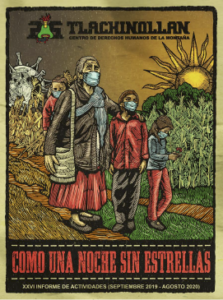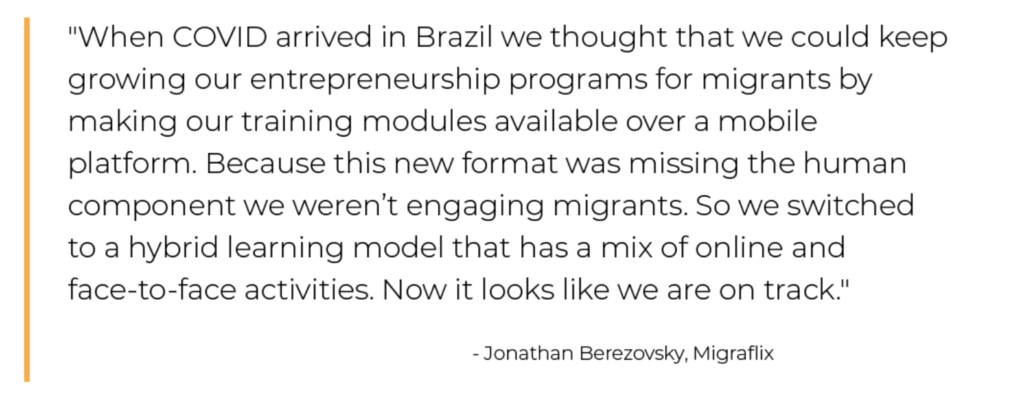Meeting the Moment:
Standing Strong with and for Migrants
This past year will be long remembered as 12 seemingly unending months of daily challenges. But it will also go down as a year in which many community-based organizations, everyday people, and funders met the moment. Together, we faced:
This report outlines the ways that HIP and our partners on the ground are working on migration and forced displacement issues responded swiftly and showed our unwavering commitment to working with community members on solutions. Through it all, we stayed focused on those most affected by the multiple crises that unfolded from one month to the next.
Responding to COVID-19:
When the Community Leads

Disproportionately represented in jobs including food processing, agriculture, construction, childcare, and other essential work, Latinxs and Latin Americans continue to be at high risk for the coronavirus. We mapped COVID-19 disparities across the Americas as well as our partners’ responses. Semillas TN, a Tennessee-based Latinx organization serving largely undocumented hotel, restaurant, and construction workers, distributed 1,500 face masks alongside educational videos on COVID-19 awareness in Spanish, American Sign Language, and Maya Mam. As Semillas’ Co-Founder Moises Rodriguez Cruz told us, “Even though hours were reduced, we kept working because we have to take care of our families.” Because many essential workers lack immigration status, they were denied federal or local aid, requiring them to “stretch” their paychecks, Moises added. HIP funding supported Semillas and some 100 other similar organizations to dispense cash grants to essential workers in the United States and Puerto Rico.

In Mexico, HIP grantee Tlachinollan, an Indigenous human rights organization, quickly pivoted to support farmworkers and jornaleros, who are their most vulnerable community members and the majority of which are Indigenous. Tlachinollan provided medical services, food, and conducted outreach to vulnerable communities about how to stay safe. HIP’s COVID-19 Rapid Response Fund, which we started to assist migrant serving and advocacy organizations, helped Tlachinollan offset unexpected costs.
Supporting Migrants on the
Move Across the Americas

For many years, large numbers of migrants have been making Central America their home. Many of them had been attempting to reach Mexico and the United States or were returning citizens who were deported from these countries. Others have migrated from neighboring countries. Costa Rica has long been a destination for Nicaraguan migrants, where binational organization Enlaces Nicaragüenses is based. HIP supported Enlaces’ COVID-19 prevention, healthcare, and aftercare programs for people who lost loved ones to the coronavirus. “The humanitarian health crisis was something else,” said Quxabel Cárdenas, Enlaces’ Director. “Thousands of undocumented migrant women in Costa Rica and their families, saw their work disappear, were haunted by hunger, risked losing their homes and the dignified lives they had worked for years to achieve.” HIP’s support has helped with food, hygiene products and personal protection. Quxabel added, “We can continue organizing, mobilizing, and amplifying these women and children’s voices on the political stage to demand social integration and equality.”
Despite the fact that Venezuelan migration is one of the largest human mobilizations in the world, funding flowing to alleviate this crisis continues to lag. Data from Response for Venezuelans shows that only 44% of the $1.4B estimated support needed for Venezuelan migrants has been funded. This issue hits close to home for the HIP familia. Amalia Brindis Delgado, our Associate Vice President of Strategy, has been mailing packages of sardines, peanut butter, and solar lamps to her family in Venezuela’s Los Llanos region to help cover shortages.

To raise visibility and engage other funders, HIP launched Venezuelans Moving Forward Fund. So far, the Fund awarded $117,500 to nine community-based or migrant-led organizations responding to the COVID-19 crisis in Chile, Brazil, Colombia and through networks across the Americas. Our Brazil-based partner Migraflix provides entrepreneurship training and microcredit to refugees and immigrants, including Venezuelans. They participate in Migraflix’s corporate catering services, which feature dishes and cultural experiences from the immigrants’ countries of origin. But when demand plummeted due to the pandemic, Migraflix pivoted to developing a kitchen providing food delivery services, enabling them to continue offering work opportunities to immigrants and refugees.

This year, we expanded our work to uplift Indigenous, LGBTQ, and Black voices, leadership and experiences. As the United States began a long overdue reckoning of anti-Black racism in the wake of George Floyd’s murder, HIP substantially increased our commitment to Afro-Latinx communities. At the same time, despite the subjugation and exploitation that Indigenous communities have faced for more than 500 years, they continue to lead by example to show how humans can live in balance with our planet even in the midst of a pandemic.

We engaged with several new organizations working on intersectionality across Black, migrant, and LGBTQ communities in the United States, including Black LGBTQ+ Migrant Project, which is housed within the Transgender Law Center. We also partnered with Haitian Bridge Alliance, a tri-national organization that supports Caribbean, African, and Afro-Latinx asylum seekers who are in U.S. detention centers or waiting immigration proceedings at the Mexican border. HIP’s support enabled Haitian Bridge Alliance to help refugees like “Christie,” who recently made the journey to the United States from Venezuela with her brothers and parents. After three decades of asylum in Venezuela from political persecution in Haiti, they arrived at the U.S. border, where the family was taken into custody. Christie, who had turned 18 years old just a few days earlier, was separated from her family. Isolated at an adult detention center in Louisiana, they did not have access to basic services. Cash assistance and persistent advocacy from Haitian Bridge Alliance made it possible for Christie to stock their commissary account and eventually reunite with their family in New Jersey.

In Guatemala, our partner Pop No’j helps Maya migrants reintegrate into the country after being de- ported from the United States or Mexico. Pop No’j Director Juan José Hurtado shared: “Our COVID response has focused on addressing the increase in hunger. We have developed family vegetable gardens to contribute to the families’ food security.” HIP has helped them to conduct outreach to community members in their own Indigenous languages, raising awareness about the rights of migrants to return to their places of origin with safety and dignity.
Hurricane Relief in Central America

Climate change and a global pandemic collided in November, when Central America tragically experienced back-to-back hurricanes on an unprecedented scale. Immediately, grantee partners in Guatemala, Honduras, and Nicaragua began sharing the devastation they were witnessing with HIP staff. Within 48 hours after the first hurricane struck, we launched the Central American Hurricane Response Fund with co-sponsors LULAC, Congressional Hispanic Caucus Institute, YWCA, and the Hispanic Heritage Foundation. Our ability to respond so quickly is a testament to the strength of our network of funders and partner organizations in Central America. HIP kicked off the call for public donations with our own $50,000 USD commitment and a funder briefing, “Mobilizing Central American Hurricane Relief,” featuring speakers from Central America and the members of diaspora living in the United States.
Our Work in Numbers
Over the course of 2020, HIP’s Migration and Forced Displacement Program awarded $2 million in grants to more than 100 organizations across the Americas, serving migrants, refugees, and asylum seekers. We increased our year-round grantmaking strategy while launching multiple emergency rapid response funds including the COVID-19 Rapid Response Fund, the Essential Fund supporting Latino essential workers with another $2 million, and the Central American Hurricanes Response Fund, with rapid response funds totaling $735,000 USD.

What Lies Ahead
We are fueled by the strength and leadership of our communities to overcome the pain and devastation caused by the pandemic, the natural disasters, and persistent racial and social injustices. What we learn daily from our partners and allies helps shape our philanthropic strategies.
HIP is grateful to the founding partners of our Migration and Forced Displacement work including Casey Family Programs, C.S. Mott Foundation, Rockefeller Brothers Fund, The California Endowment, The David and Lucile Packard Foundation, The Ford Foundation, The Open Society Foundation, Tinker Foundation, as well others who prefer to remain anonymous.
In 2021, we will continue growing our transnational network with focus in Mexico, Central and South America. We will serve as a convener, connector and an expert source of information on migration in the Americas, and support our grantees’ capacity to build sustainable, long-term solutions.
